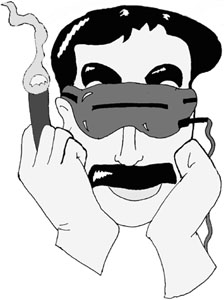![[Metroactive Features]](/features/gifs/feat468.gif)
[ Features Index | Silicon Valley | Metroactive Home | Archives ]

Laugh While You Can By Annalee Newitz LET'S FACE IT--award ceremonies are always kind of trashy. There's a lot of shuffling and coughing, some canned entertainment and bad decorations. You're usually there to support a friend or see some famous people you'll never get to meet, and all you want to do the entire evening is fold your program into a paper airplane and throw it at the stage. That's why I went to the 12th annual Ig Nobel Prizes at Harvard this year. It's the only award ceremony in the world where you're actually instructed to throw paper airplanes and heckle the winners. Invented by Marc Abrahams, the unhinged genius behind the science humor journal Annals of Improbable Research (www.improbable.com), the Ig Nobels are awards for, as the program bill informed us, "achievements that cannot or should not be reproduced." Past winners have been people like Chris Niswander, who received a Computer Science Ig Nobel in 2000 for inventing PawSense, software that detects when a cat is walking across your keyboard. This year's Ig Nobel Prize ceremony, held in one of Harvard's largest and most venerable theaters, had a theme: jargon. We were entertained with a miniopera about jargon at an academic conference, and several satirical 24-second speeches were devoted to the jargon of various disciplines. Whenever our MC said the word "jargon," the entire audience yelled "JARGON" at the top of its lungs in solidarity. Several of my fellow journalists and I formed a delegation and were introduced with much fanfare as a group that "reduced incomprehensible scientific gobbledygook to sensationalist pabulum for the masses." A couple of composition professors were awarded the Literature Prize for their paper "The Effects of Pre-Existing Inappropriate Highlighting on Reading Comprehension." Their conclusion? "Don't read books highlighted by morons," deadpanned one of them. A buoyant German physicist drank beer from a beaker and toasted the audience after winning the Physics Award for his "Demonstration of the Exponential Decay Law Using Beer Froth." Wiping his mouth, he exhorted, "More research needs to be done!" Paper airplanes soared through the air. The audience stomped and then began barking and howling when the Peace Prize was awarded to a Japanese group that markets dog-to-human translation software. And of course, there was a standing ovation when Enron and a handful of other corporations won the Economics Prize for finding a way to use imaginary numbers in the business world. The humor was a little bit slapstick, a little bit wordplay, and had no shortage of serious edge to it. In some ways, it reminded me of watching one of my favorite Marx Brothers movies, Duck Soup (1933). This famous crazoid flick, released in the depths of the Great Depression and during the rise of Fascism in Europe, centers on the freaky career of corrupt dictator Rufus T. Firefly (Groucho). Installed as the leader of financially strapped imaginary kingdom Freedonia by a rich widow who promises to bail out the government if they'll let Firefly run things, he begins his reign by singing, "If any form of pleasure is exhibited / Report to me and it will be prohibited / I'll put my foot down, so shall it be / This is the land of the free." Later, Firefly starts a bogus war using the widow's money, chuckling, "And remember while you're out there risking life and limb through shot and shell, we'll be in here thinking what a sucker you are." Needless to say, when the film came out, critics and audiences were intensely weirded out. Duck Soup sank without a trace, only to be rediscovered by a new generation that embraced its dark humor during the Vietnam War. The serious antiwar, anti-government corruption subtext of Duck Soup had clearly stood the test of time. I thought a lot about Firefly during the Ig Nobel miniopera, written by Abrahams, whose main theme was that jargon creates a blissful state of misunderstanding that prevents us from killing each other. And I wondered, not for the first time, if there wasn't a profoundly dark side to the otherwise goofy humor at the Ig Nobels. What kinds of fears were being turned into satire that night? Perhaps that, for the masses, science is completely incomprehensible? Or, worse, that science is nothing but dictatorial nonsense, words and theories used for social control? Perhaps the dark kernel at the heart of the evening's jokes was more obvious. After all, the worst thing that could happen to any scientist or thinker is to have her work trivialized and turned into a joke. To have her remarkable diagrams folded into paper airplanes. Then again, it's hard to think too much about scientists' anxieties when you can giggle over the work of an Australian researcher, awarded the Interdisciplinary Research Ig Nobel for his pioneering "comprehensive survey of human bellybutton lint."
Annalee Newitz (nobel@techsploitation.com) is a surly media nerd who would rather be Ig than Nobel.
Send a letter to the editor about this story to letters@metronews.com. [ Silicon Valley | Metroactive Home | Archives ]
|
From the October 17-23, 2002 issue of Metro, Silicon Valley's Weekly Newspaper.
Copyright © Metro Publishing Inc. Metroactive is affiliated with the Boulevards Network.
For more information about the San Jose/Silicon Valley area, visit sanjose.com.